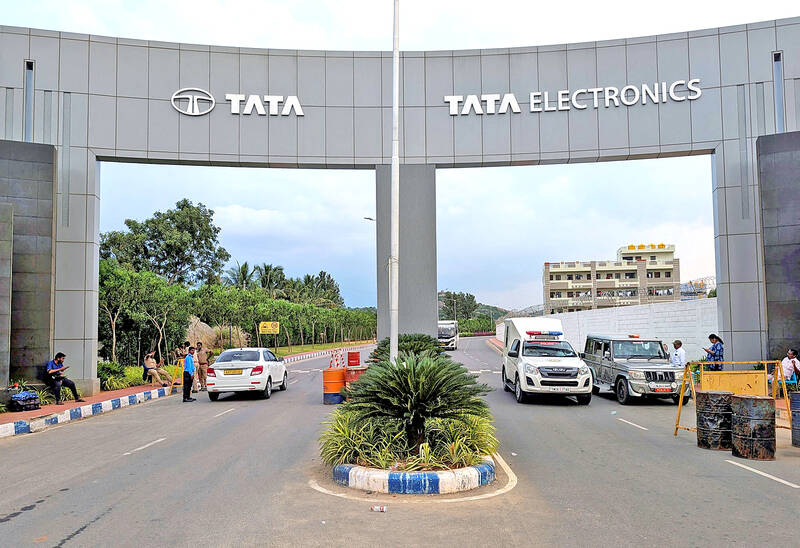At least 10 people received medical treatment, with two hospitalized after a major fire on Saturday disrupted production at a key Tata Electronics Pvt Ltd plant in southern India that makes Apple Inc’s iPhone components.
The fire occurred at the plant in the city of Hosur in Tamil Nadu state that makes some iPhone components. It broke out near another building inside the Tata complex, which was to begin producing complete iPhones in the coming months.
The fire was contained to one building and has been extinguished fully, top district administrative official K.M. Sarayu said.

Photo: Reuters
No decision has been made on when manufacturing could restart, she said.
“Fumes are still coming since it’s a chemical hazard. It will take time for the search and rescue team to go inside and do an assessment. We have to wait till tomorrow,” she added.
Sarayu said that 523 workers were on shift when the fire broke out in the early morning and that all workers had been evacuated and accounted for.
Savitri, an eyewitness who lives near the plant and only gave her first name, said she heard “loud sounds around 5:30am that sounded like crackers going off. After that, we just saw plumes of smoke from the building, and there was thick smoke till at least 10 in the morning.”
The fire began in an area used to store chemicals, a fire official said on condition of anonymity as he was not authorized to speak to the media.
Tata Electronics is one of the major contract makers of iPhones in India, along with Foxconn Technology Group (富士康).
The company said it was investigating the cause of the fire and would take the necessary steps to safeguard employees and other stakeholders.
“Our emergency protocols at the plant ensured that all employees are safe,” a Tata Electronics spokesperson said.
It was not yet possible to say when production at the facility would resume, as “we will need to go in to understand more, depending on the damage,” J. Saravanan, a senior district official charged with handling industrial safety, said.
He said the injuries were all related to smoke inhalation but gave no further detail.
Production was halted and employees were sent home for the day following the fire, a person with direct knowledge of the incident said, describing the blaze as chemical-related.
It was not yet clear if a neighboring building where smartphone manufacturing was due to start by year-end had also been affected, a second industry source said.
With the facility inaccessible at the moment, an assessment of damage from the fire would have to be done later, the source said.
Apple made no immediate comment on the incident.
Last year, Apple supplier Foxlink Group (正崴) halted production at its assembly facility in the southern Indian state of Andhra Pradesh after a massive fire led part of the building to collapse.

Nvidia Corp chief executive officer Jensen Huang (黃仁勳) on Monday introduced the company’s latest supercomputer platform, featuring six new chips made by Taiwan Semiconductor Manufacturing Co (TSMC, 台積電), saying that it is now “in full production.” “If Vera Rubin is going to be in time for this year, it must be in production by now, and so, today I can tell you that Vera Rubin is in full production,” Huang said during his keynote speech at CES in Las Vegas. The rollout of six concurrent chips for Vera Rubin — the company’s next-generation artificial intelligence (AI) computing platform — marks a strategic

REVENUE PERFORMANCE: Cloud and network products, and electronic components saw strong increases, while smart consumer electronics and computing products fell Hon Hai Precision Industry Co (鴻海精密) yesterday posted 26.51 percent quarterly growth in revenue for last quarter to NT$2.6 trillion (US$82.44 billion), the strongest on record for the period and above expectations, but the company forecast a slight revenue dip this quarter due to seasonal factors. On an annual basis, revenue last quarter grew 22.07 percent, the company said. Analysts on average estimated about NT$2.4 trillion increase. Hon Hai, which assembles servers for Nvidia Corp and iPhones for Apple Inc, is expanding its capacity in the US, adding artificial intelligence (AI) server production in Wisconsin and Texas, where it operates established campuses. This

US President Donald Trump on Friday blocked US photonics firm HieFo Corp’s US$3 million acquisition of assets in New Jersey-based aerospace and defense specialist Emcore Corp, citing national security and China-related concerns. In an order released by the White House, Trump said HieFo was “controlled by a citizen of the People’s Republic of China” and that its 2024 acquisition of Emcore’s businesses led the US president to believe that it might “take action that threatens to impair the national security of the United States.” The order did not name the person or detail Trump’s concerns. “The Transaction is hereby prohibited,”

Garment maker Makalot Industrial Co (聚陽) yesterday reported lower-than-expected fourth-quarter revenue of NT$7.93 billion (US$251.44 million), down 9.48 percent from NT$8.76 billion a year earlier. On a quarterly basis, revenue fell 10.83 percent from NT$8.89 billion, company data showed. The figure was also lower than market expectations of NT$8.05 billion, according to data compiled by Yuanta Securities Investment and Consulting Co (元大投顧), which had projected NT$8.22 billion. Makalot’s revenue this quarter would likely increase by a mid-teens percentage as the industry is entering its high season, Yuanta said. Overall, Makalot’s revenue last year totaled NT$34.43 billion, down 3.08 percent from its record NT$35.52